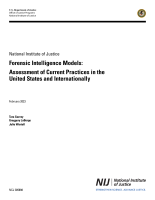Law enforcement operations
Better Measures of Justice Identifying High-Priority Needs to Improve Data and Metrics in Policing
Research in Brief: Predictive Policing: Understanding and Applying Analytical Techniques To Prevent and Combat Crime
Forensic Intelligence Models: Assessment of Current Practices in the United States and Internationally
Template for a "Standard Operating Policy (SOP) Guidance for Law Enforcement Use of Small Unmanned Aircraft Systems (sUAS)"
Support for Research, Testing, and Evaluation of Counter-Unmanned Aerial Systems in Law Enforcement Operations
U.S. National Footwear Database System Feasibility Study
Improving Hot Spot Policing through Behavioral Interventions
Promising Practices from Law Enforcement’s COVID-19 Response: Protecting the Public
Expanding Research to Examine the Impacts of Forensic Science on the Criminal Justice System
In 2004, the National Institute of Justice created the social science research on forensic sciences (SSRFS) research program to explore the impact of forensic sciences on the criminal justice system and the administration of justice. Much of the early research from the SSRFS program focused on DNA processing and the use of DNA in investigations and prosecutions.
See the YouTube Terms of Service and Google Privacy Policy
Wastewater Epidemiology To Examine Stimulant Trends (weTEST)
A National Assessment of Demand Reduction Efforts, Part II: New Developments in the Primary Prevention of Sex Trafficking
A Safe Port in the Storm
Video: Impact on School Safety of Collaboration Between Law Enforcement & Rural Schools
Hyperspectral Imaging and the Search for Humans, Dead or Alive
Christian Peterson
Research and Law Enforcement Partnerships Manage Civil Disturbances More Effectively
Law enforcement agencies can use research-based practices to manage protests and civil disturbances more effectively. In this video, Dr. Tamara Herold, Associate Professor, University of Nevada, Las Vegas, and Ryan Lee, Assistant Chief, Portland Police Bureau, discuss some of those methods, some of the misconceptions about how law enforcement should respond to civil disturbances, and where agencies should begin when developing civil disturbance response plans.
See the YouTube Terms of Service and Google Privacy Policy
Improving Officer Safety on the Roadways
An International View of Civil Disturbance Unit Standards and Training
This video provides and international perspective on civil disturbance units.
Dr. Ben Burger, Chief, Unterstützungskommando, Dachau, Germany, discusses how his unit’s response to civil disturbances compares to his American counterparts and the approaches that contribute to his unit’s success.
See the YouTube Terms of Service and Google Privacy Policy
The National Broadband (Communications) Plan: Issues for Public Safety
The Federal Communications Commission delivered the National Broadband Plan in March 2010. As part of the plan, the FCC proposed a strategy for implementing a national public safety broadband network that would allow public safety responders anywhere in the nation to send and receive critical voice, video and data to save lives, reduce injuries, and prevent acts of crime and terror. How this strategy is implemented will have a significant impact on criminal justice and other public safety agencies nationwide, both with respect to operational capability and to resources.
The NIJ/IACP Partnership
This video, featuring NIJ Director Nancy Rodriguez and Hassan Aden of the International Association of Chiefs of Police (IACP), describes the partnership between NIJ and IACP and how the two organizations are linking what we know about what works in policing to the field.
See the YouTube Terms of Service and Google Privacy Policy




